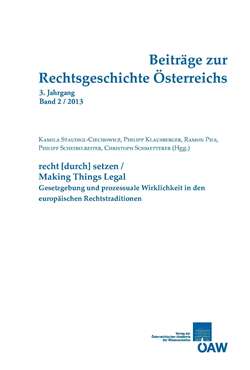
Beiträge zur Rechtsgeschichte Österreichs 2 / 2013, pp. 502-511, 2014/01/30
recht [durch] setzen - Making Things Legal.
Gesetzgebung und prozessuale Wirklichkeit in den europäischen Rechtstraditionen

Magdeburg law was in force in many Polish cities as a result of location and translocation from Polish to German law. Create and modify rights can take many forms in the Polish cities of the late Middle Ages and Renaissance: legislation of king and parliament, municipal legislation, legal-theoretical proposals and modifications of legal manuscripts (Mirror of Saxony and Weichbild of Magdeburg). According to the Magdeburg law, change of the written law required a consent of the owner of the city, so in the case of the royal cities – of the monarch. Thus, the legislative procedure in many cases require the mandatory participation of the king: in cases of a new regulation was contrary to the written law (criminal law, civil law, the city system and other issues addressed in the Mirror of Saxon and Weichbild of Magdeburg) and when he played a role as a legislator in the king's powers (taxes, duty exemptions, business licenses, et al.). Most of the regulations was initiated by stakeholders (municipalities, citizens et al.). The process of the reformation of the municipal law includes not only the replacement of the existing regulations and adding the new regulations, but also the necessary steps preceding and following the legislation sensu stricto (E.g. the cities regularly gave "gifts" to public officials, hoping for their support).